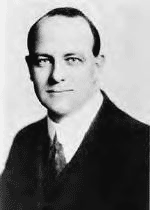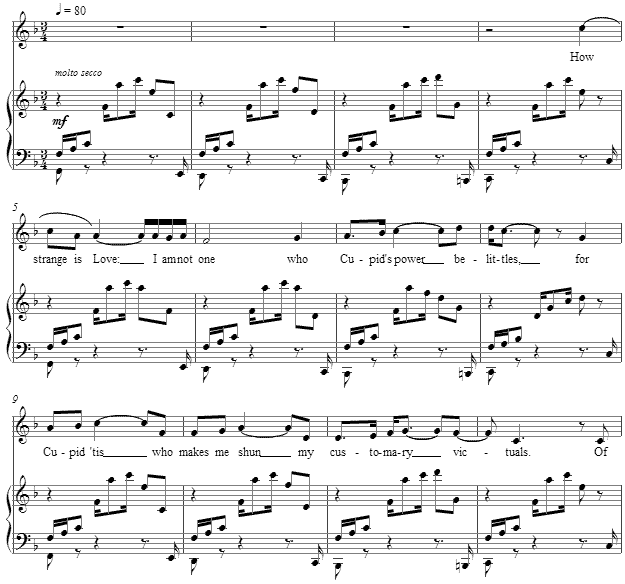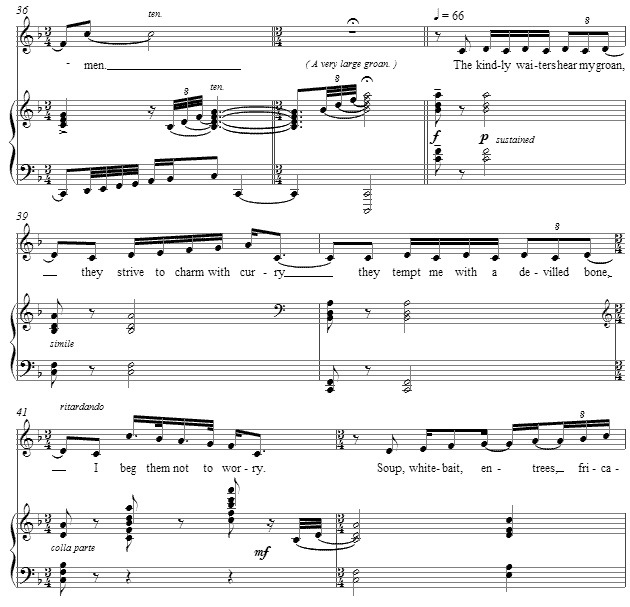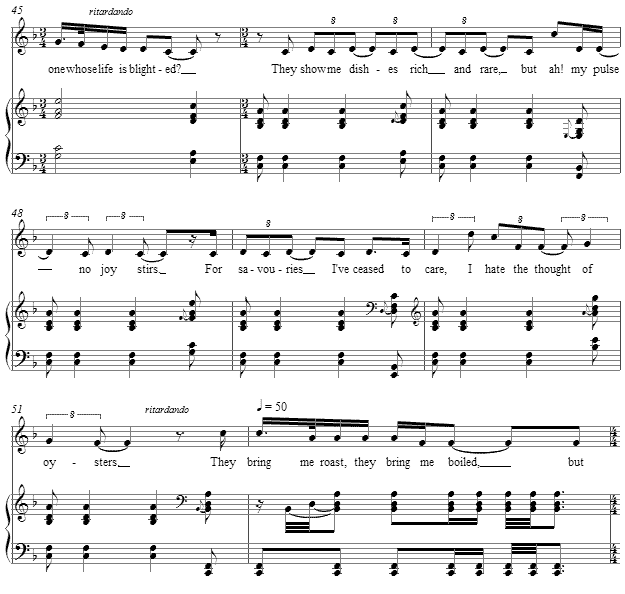Music and Texts of GARY BACHLUND Vocal Music | Piano | Organ | Chamber Music | Orchestral | Articles and Commentary | Poems and Stories | Miscellany | FAQs |
The Gourmet's Love Song - (2006)
P. G. Wodehouse
originally for baritone and piano
How strange is Love: I am not one
Who Cupid's power belittles,
For Cupid 'tis who makes me shun
My customary victuals.
Of, Effie, since that painful scene
That left me broken-hearted,
My appetite, erstwhile so keen,
Has utterly departed.
My form, my friends observe with pain,
Is growing daily thinner.
Love only occupies the brain
That once could think of dinner.
Around me myriad waiters flit,
With meat and drink to ply men;
Alone, disconsolate, I sit,
And feed on thoughts of Hymen.
The kindly waiters hear my groan,
They strive to charm with curry;
They tempt me with a devilled bone --
I beg them not to worry.
Soup, whitebait, entrées, fricasees,
They bring me uninvited.
I need them not, for what are these
To one whose life is blighted?
They show me dishes rich and rare,
But ah! my pulse no joy stirs,
For savouries I've ceased to care,
I hate the thought of oysters.
They bring me roast, they bring me boiled,
But all in vain they woo me;
The waiters softly mutter, 'Foiled!'
The chef, poor man, looks gloomy.
So, Effie, turn that shell-like ear,
Nor to my sighing close it,
You cannot doubt that I'm sincere --
This ballad surely shows it.
No longer spurn the suit I press,
Respect my agitation,
Do change your mind, and answer, 'Yes',
And save me from starvation.From Punch, Christmas Eve, 1902
[ 6 pages, 3' 20" ]
P. G. Wodehouse
Sir Pelham Grenville Wodehouse KBE (1881 – 1975) was an English comic writer who enjoyed enormous popular success for more than seventy years. Wodehouse was an acknowledged master of English prose admired both by contemporaries like Hilaire Belloc, Evelyn Waugh and Rudyard Kipling and by modern writers like Salman Rushdie, Douglas Adams and Terry Pratchett.
Best-known today for the Jeeves and Blandings Castle novels and short stories, Wodehouse was also a talented lyricist who worked with Cole Porter on the musical Anything Goes and frequently collaborated with Jerome Kern. He wrote the lyrics for the hit song "Bill" in Show Boat. Called "Plum" by most family and friends, he was born prematurely to Eleanor Wodehouse whilst she was visiting Guildford. He attended boarding school, where he saw his parents only once every six or seven years. Feeling abandoned, Wodehouse grew very close to his brother, who shared his love for art. Wodehouse filled the voids in his life by writing relentlessly. He spent quite a few of his school holidays with one aunt or another; this forever gave him a healthy horror of the 'gaggle of aunts', reflected in Bertie Wooster's terrifying aunts Agatha and Dahlia, as well as Lady Constance Keeble's tyranny over her many nieces in the Blandings Castle series.
He was educated at Dulwich College, but his anticipated progression to university was stymied by family financial problems. Subsequently he worked for the Hong Kong and Shanghai Bank for two years, though he was never really interested in banking as a career. Having taken up writing as his profession, he eventually went to Hollywood, where he earned enormous amounts as a screenwriter. Many of his novels were also serialized in magazines such as The Saturday Evening Post, which also paid large amounts of money. He married in 1914, gaining a stepdaughter.
Although Wodehouse and his novels are considered quintessentially English, from 1924 on he lived in France and the United States, and in 1955 he became an American citizen. He was also profoundly uninterested in politics and world affairs. When World War II broke out in 1939 he remained at his seaside home in Le Touquet, France, instead of returning to England, apparently failing to recognize the seriousness of the conflict. He was subsequently taken prisoner by the Germans in 1940 and interned by them for a year, first in Belgium, then at Tost in Upper Silesia (now in Poland). While at Tost, he entertained his fellow prisoners with witty dialogues, which, after being released from internment a few months short of his 60th birthday, he used as the basis for a series of radio broadcasts he was persuaded by the Germans to make from Berlin. Wartime England was in no mood for light-hearted banter, however, and the broadcasts led to many accusations of collaboration and even treason. Some libraries banned his books. Foremost among his critics was A. A. Milne, author of the "Winnie the Pooh" books; Wodehouse got some revenge by creating a ridiculous character named "Timothy Bobbin," who starred in hilarious parodies of some of Milne's children's poetry. Among Wodehouse's defenders were Evelyn Waugh and George Orwell.
The criticism led Wodehouse to move permanently to America with his wife, Ethel. They had no children. He became an American citizen in 1955, and never returned to his homeland. He was made a Knight of the British Empire (KBE) shortly before his death at the age of 93. It is widely believed that the honor was not given earlier because of lingering resentment about the German broadcasts, although the Queen Mother was so anxious for Wodehouse to be knighted that she offered to perform the service herself.
Wodehouse is above all a master of English comedic phrasing. His descriptions of persons are as rich as anything in Shakespeare, particularly when issued as insults from one character to another. Yet no matter how effusive the insults, Wodehouse somehow manages to convey a sunny quality that never comes across as truly mean-spirited.
Wodehouse was a prolific author, writing ninety-six books in a career spanning from 1902 to 1975. His works include novels, collections of short stories, and a musical comedy. Many characters and locations appear repeatedly throughout his short stories and novels, leading readers to classify his work by "series."
Originally written for baritone or bass, the tessitura in the lowest key is from the low G to highest D. A British musical hall style informs this accompaniment gesture, meant to be dryly played, and therefore noted as molto secco.
The recitative-like center of the song itemizes the various delicacies which as offered as an enticement to the love-sick and love-starved hero.
As the recitation of the foods offered mount up, so does the accompaniment, before returning -- as with his thoughts of love -- full circle.
The final repetitions of the phrase, "answer, 'yes,'" are answered only by his own question, "How strange is love?" How strange, indeed.
The score for The Gourmet's Love-Song is available as a free PDF download, though any major commercial performance or recording of the work is prohibited without prior arrangement with the composer. Click on the graphic below for this piano-vocal score and separate horn part.
The Gourmet's Love-Song - low (original key)
The Gourmet's Love-Song - high
The Gourmet's Love-Song - medium



